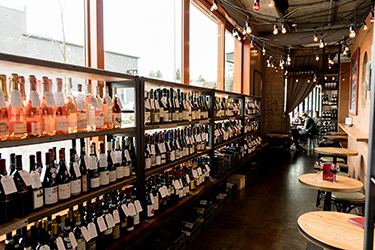|
Subscribe / Renew |
|
|
Contact Us |
|
| ► Subscribe to our Free Weekly Newsletter | |
| home | Welcome, sign in or click here to subscribe. | login |
Architecture & Engineering
| |
June 8, 2020
Seattle design firm gives free ‘visioning’ services amid COVID-related slowdown
Journal Staff Reporter
The COVID-19 pandemic has given Kate Cudney and her staff at Seattle-based Hinge Studio time on their hands.
To fill that time, do some good and highlight its work, the practice launched an initiative that offers up to 32 hours of pro bono architectural “visioning” services — enough time to do a concept design but not full architectural drawings, said Cudney, Hinge principal architect and founder.
So far the firm is working on five projects and has selected another two for what it is calling the Virtual Napkin Sketch initiative.
“We’re being given that opportunity to show off what we’re doing,” said Cudney, “and honestly it’s about not going crazy.”
Some of the projects are apropos for the times.
Hinge is working with Heavy Restaurant Group, whose establishments include Purple, Claret and Barrio, and which was a client before the pandemic.
It is trying to determine how to shift the way three of Heavy’s restaurants — Meet the Moon and Fiasco in Seattle and The Commons in Woodinville — interact with their guests and how to reconfigure the interiors and outdoor dining spaces in anticipation of such businesses being allowed to reopen in phases, Cudney said.
One thing being considered is space that spills out onto the sidewalks to provide more distance between tables. Another is adapting some of the three restaurants to grab-and-go marketplaces.
That work has morphed into a plan by Hinge to provide for free on its website guidelines for bars and restaurants looking to reopen all over the country, including a recommendation that they transform part of their establishments into retail space, Cudney said. The guidelines will also be in a pamphlet Hinge will send out to its contacts in that industry.
The application for Napkin Sketch is at the firm’s website at http://www.hingestudio.net. The guidelines will be there in a few weeks, Cudney said.
Another of Hinge’s Napkin Sketch projects is for 8 Limbs, a yoga studio chain in Seattle that is preparing for the possibility of decreased attendance as it reopens, Cudney said. It is considering reconfiguring its studios with more private spaces, where one-on-one or one-on-two sessions could happen. Or it may rent out some of its space for private lessons. Some of that will be temporary and some likely will be permanent, she said.
The chain shifted quickly to online classes as the pandemic took hold and is looking to gain more economic security and build community, she said.
The other Napkin Sketch projects are designing outside stairs and a roof structure for a cabin in Eastern Washington made of shipping containers; a feasibility study for two State Farm offices that want to build office space for themselves in Seattle’s Rainier Beach neighborhood; and a concept design to convert an old barn to shop space for Danger Laser Creative, a Rock Falls, Illinois, firm that does computer numerical control fabrication. The other two selected Napkin Sketch projects in the works are concept designs for prefab dwellings in Washington.
Some of these projects give Hinge Studio a chance to work in markets it hasn’t previously, which should be helpful longer-term, Cudney said.
Hinge may select one or two more Virtual Napkin Sketch projects this year, and the initiative might become a regular part of what it does, with three or four projects picked each year.
“I don’t think it is something that will die with COVID,” Cudney said.
Hinge provides architecture and interior design. In normal times, it mostly does adaptive reuse and alterations, typically residential and small- to medium-scale commercial projects, including restaurants, bars, wineries and distilleries.
Its projects are usually 10,000 square feet or under, but it designed the 36,000-square-foot DeLille Cellars winery and office in Woodinville, which was completed late last year, Cudney said.
More than 50% of Hinge Studio’s projects went on hold because of the pandemic, but all the five-person staff has been retained and is working remotely.
Architects, said Cudney, are “the canaries in the coal mine’’ — the first to be hit in a recession that affects commercial real estate.
She said Hinge is feeling optimistic that its projects will come back, but “It’s just a question of when.”
One — a renovation to a house — already has, and the firm is starting to see a spike in inquiries for such work, likely “because everybody’s stuck at home looking at the projects they want to do,” Cudney said.
During this pandemic, she said, it feels like people are in a holding pattern and no one knows what’s coming.
It’s hard to dream, Cudney said, and “I believe dreaming is essential for the human spirit.”
The Virtual Napkin Sketch initiative gives people that chance to dream, she said.
Lynn Porter can be
reached by email or by phone
at (206) 622-8272.



